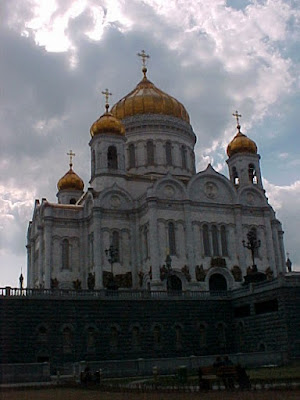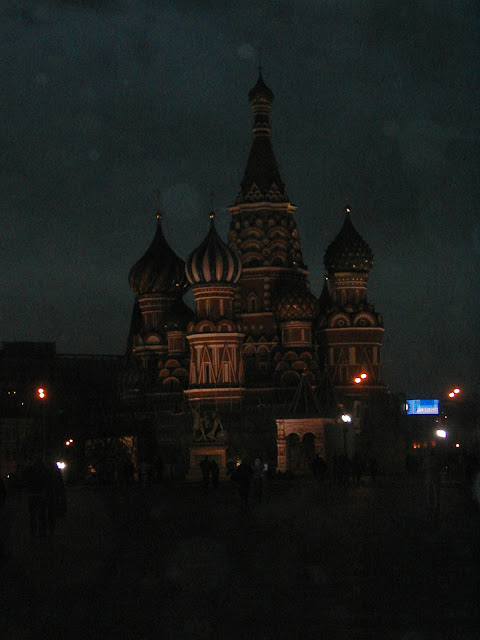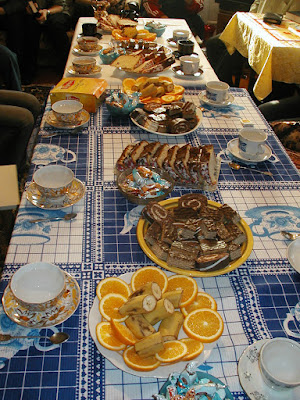We de-trained when we arrived in Moscow and immediately boarded a bus for a city wide excursion. "Excursion," here, means a bus tour around the city: a drive past or a pause beside famous places. In that fashion, we passed by the Kremlin, Red Square, Saint Basil's Church, Peter the Great's Memorial, the 1980 Winter Olympic site, Moscow State University, the huge Great Patriotic War Memorial (where we were permitted to disembark and walk around), and Christ the Savior Cathedral.
Having seen these wonders mostly from afar and in motion, we exited the tour bus at one end of Arbat Street, a kilometer-long open-market pedestrian "mall" in central Moscow, where we would eat lunch at McDonald's and shop for small keepsakes to take home. McDonald's was exceptionally clean, otherwise it was exactly as we all expected.
Two-thirds of the shops on Arbat Street, which we walked after lunch, had already closed since this was a morning market area.
As with most shopping opportunities, it was helpful to have an interpreter to help with negotiations or barter or for information. Below, Andrew is explaining something to me as he made the rounds as our team investigated various souvenir venues.
I was not a serious shopper on Arbat Street since I already had my treasure, Andrew's hand-carved and hand-painted nativity set, now safely packed in my suitcase. Stefan visited the many displays of original art for something engaging that would survive the trip back to the States.
When we reached the other end of Arbat Street, purchases in hand, we entered the subway for our ride to our hotel. Although I am aware that we tend to learn in layers when we travel, questions remain. How does one begin to recognize what makes a place significant? What features tell us enough about a particular place? Clearly, I didn't know entirely what to pay attention to on these quick visits. The bus tour helped a bit. Being with translators like Andrew helped a great deal. But having "caught" some things the first time around, the traveler ideally needs to return to build on first knowledge.
One of those tantalizing bits of information we were told was that a "terrorist" bombing on the subway two months before happened near where we were boarding. Forty-one people were killed and hundreds injured. The attack was linked somehow to the ongoing conflict with Chechnya that none of us had heard much about. It appeared on the "evening news," then quickly disappeared as our news stories commonly do. Few in the West speak of it, but parallels with the present conflict in Ukraine are striking.
The subway, by the way, we found to be gorgeous, ornate, clean, full of compelling mosaics -- so apart from the possibility of being bombed again, which was real if remote, the subway was a treat.
An hour later we rode the subway back into the city for dinner at a Mongolian restaurant and, afterward, to tour Red Square.
Our walk through Red Square needs its own conversation [see Pt.2]. In my look back on this quick tour, I wonder about the whole "tourist" experience, what it means or ought to mean. I have been to Russia, seen the gems of Moscow, briefly, and mostly from the outside. That visit was the first of what I had hoped to be several opportunities, several layers of seeing, although a return now appears impossible. I must confess I have never wanted to be a tourist, as we commonly think of that role. That is why I particularly treasure the months Donna and I were able to live in north London and in Busan, Korea. That is why it was so meaningful for us to participate in worship services and to visit in homes in Egypt and for our basketball team to visit a home church and to venture into the muddy back streets earlier in our visit to Vladimir.
In short, I have a strong desire to go places, to see and hear, to get closer to the heart of what it means to be Egyptian or Korean or Chinese or, in this case, Russian, to meet people where they live. I have wanted to see beyond the pictures in the books, to see things in a different light.
[Credit: This and many of the clearer photographs were taken by John Woodard. While many of us stood at the same spot, here and elsewhere, and snapped the same scene, John's photos are often the best of the lot.]
















